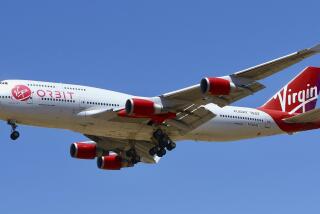French Firm Gives Up on Unit of LTV : Aerospace: Loral may now buy the missile operation alone. Thomson-CSF’s withdrawal could also throw the sale wide open.
- Share via
PARIS — French state-controlled defense electronics company Thomson-CSF said Tuesday that it had abandoned plans to buy LTV Corp.’s missiles unit with Loral Corp., paving the way for Loral to buy the unit alone for up to $240 million.
Shortly after Thomson-CSF dropped out, Loral said in New York it could not meet Thomson-CSF’s desire for greater participation in LTV Missiles. Loral said it planned to buy the unit by itself for $240 million, at most.
But some industry analysts said the withdrawal of Thomson could throw the whole sale wide open, with other companies likely to make their own bids.
A Thomson-CSF spokeswoman declined comment on why the French company gave up on the Loral deal. Thomson had originally sought to buy LTV Missiles on its own but was rebuffed by U.S. opposition to the deal on national security grounds.
But she said Thomson-CSF, the world’s second-largest defense electronics company, was still interested in expanding into the American market.
Loral last week said it agreed to pay $230 million for 94% of LTV’s missiles unit, with Thomson-CSF paying $30 million for a 6% stake and a debenture convertible into a 3.9% stake in the new company.
At the time Thomson-CSF declined to confirm the deal, saying nothing was signed.
Prudential Securities defense industry analyst Byron Callan said he was not surprised Thomson-CSF had backed out, adding that the benefits of a less than 10% stake seemed limited.
“With up to a 10% stake this would be a financial investment, with no access to the technology and capabilities that they found attractive in LTV missiles,” Callan said. “Thomson-CSF probably has better things to do with its money.”
In April, Thomson-CSF agreed to pay $300 million for LTV Missiles and U.S. investment house Carlyle Group agreed to pay $150 million for LTV’s aircraft business in a joint deal.
However, Thomson-CSF’s bid ran into harsh criticism from the U.S. Congress, which argued that selling LTV Missiles to a foreign company would compromise national security.
Earlier this month, Thomson-CSF withdrew its bid from consideration by the Committee on Foreign Investment in the United States, which scrutinizes such acquisitions, and began looking for new ways to craft the bid so as to allay the security concerns.
Prudential’s Callan said other U.S. missile companies such as Martin Marietta Corp., Lockheed Corp., Raytheon Co. or Hughes Electronics Co. might seek to top Loral’s LTV Missiles bid.
“I frankly think that Thomson-CSF’s having bowed out could throw this wide open again,” Callan said. “U.S. companies may bid to stop Loral picking up the property. . . . This is far from over.”
Any transaction must be approved by the U.S. Bankruptcy Court that has been following LTV’s Chapter 11 proceedings.
Marietta and Lockheed this spring offered $385 million for LTV’s missile and aerospace businesses, but they were outbid by the Thomson-CSF/Carlyle group, which included Hughes as a minority partner.
In the meantime, Dallas-based LTV said its second-quarter earnings soared to $138.6 million, equal to $1.08 a share, from $13.4 million.
More to Read
Inside the business of entertainment
The Wide Shot brings you news, analysis and insights on everything from streaming wars to production — and what it all means for the future.
You may occasionally receive promotional content from the Los Angeles Times.








